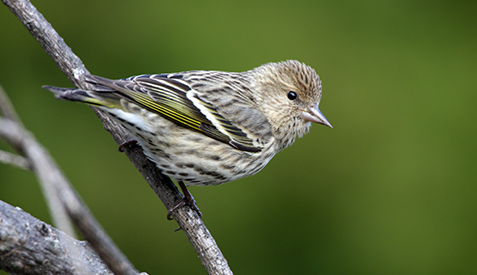2021 Salmonella Outbreak Linked to Wild Songbirds

Posted August 23, 2021
This outbreak investigation is over. Wild birds can carry Salmonella and make people sick. Always take steps to stay healthy around wild birds and bird feeders.
Fast Facts
- Illnesses: 29
- Hospitalizations: 14
- Deaths: 0
- States: 12
- Investigation status: Closed

Salmonella in Wild Songbirds and in People in the United States
Birds can carry germs like Salmonella while looking healthy and clean. Salmonella germs can spread between birds, to pets, and to people.
You can get sick when you touch your mouth with unwashed hands after touching wild birds, bird feeders or bird baths, or your pets that have contact with wild birds.
What You Should Do
Help keep people and animals healthy around wild birds, feeders and bird baths.
- Clean your bird feeder and bird bath at least monthly. You may need to clean more often as bird poop and other dirt builds up on your feeder.
- Clean feeders outside your house when possible. If you clean it indoors, use a laundry sink or bathtub, and thoroughly clean and disinfect the area right after. Do not clean bird feeders in your kitchen or places where food is prepared or stored.
- Follow these five steps to clean and disinfect your bird feeder:
- Scrub feeder with warm soapy water to remove dirt. Rinse with clean water to remove soap.
- Soak in a diluted bleach solution (9 parts water and 1 part bleach) for at least 10 minutes.
- Rinse with water to remove any remaining bleach solution.
- Let it dry before refilling it.
- Wash your hands with soap and water after touching your bird feeder.
- Clean and refill your bird bath weekly or when it’s visibly dirty.
- Keep pets away from bird feeders and bird baths and the areas under them.
- If you find a sick or dead bird in your yard, remove your feeder and bird bath for two weeks and clean them outdoors.
Do not touch or hand-feed wild birds with your bare hands.
- If you find a sick bird, call your state wildlife agency or wildlife rehabilitator.
- If you find a dead bird, check with your state wildlife agency for information about reporting dead birds in your area.
- Some state and local agencies collect dead birds to test for diseases.
- If your local officials tell you to throw the dead bird away, wear gloves or place a plastic bag over your hand to pick it up. Place the bird in a plastic bag, tie the bag up, and throw it away, following your local officials’ instructions. Some locations may allow dead birds to be disposed of in your regular trash. Wash your hands with soap and water when you are finished.
Always wash your hands with soap and water:
- Right after touching your bird feeder or bird bath
- Right after handling a bird, even if you wore gloves or used a bag
- Right after touching your pet or pet’s supplies (like food, bowls, and toys)
- Right after picking up your pet’s feces (poop), even if you used a bag
- Before you eat or drink